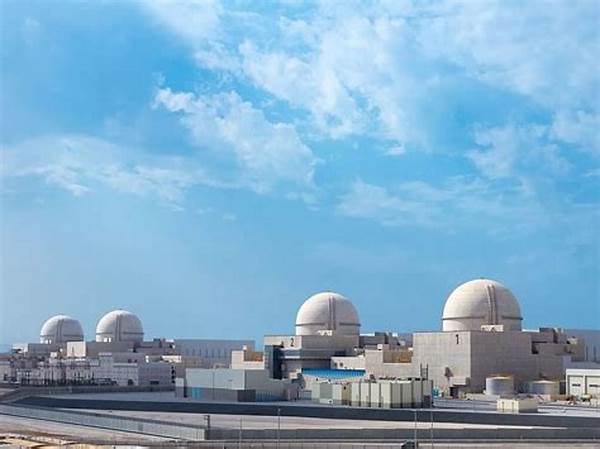In the contemporary discourse on energy solutions, peaceful nuclear energy development stands as a prominent subject of interest. As the global community seeks sustainable and environmentally friendly energy alternatives, nuclear power emerges as a viable option with the potential to provide immense benefits in terms of energy security and reduced carbon emissions. The development and deployment of nuclear energy for peaceful purposes necessitate careful planning, international cooperation, and a steadfast commitment to safety and non-proliferation principles.
The Role of Peaceful Nuclear Energy in Global Energy Policy
The integration of peaceful nuclear energy development into global energy policy frameworks is crucial for meeting the rising energy demands while mitigating environmental impacts. Nuclear power provides a substantial and continuous power supply, which can complement renewable energy sources like wind and solar. It plays a significant role in diversifying energy portfolios, enhancing energy security, and reducing reliance on fossil fuels. However, the advancement of peaceful nuclear energy development must be accompanied by strict adherence to international safety standards and a concerted global effort to prevent nuclear proliferation. This entails robust regulatory frameworks and technological innovations to manage and dispose of nuclear waste safely, ensuring a sustainable future for the generations to come.
Advantages of Peaceful Nuclear Energy Development
1. Energy Security: Peaceful nuclear energy development ensures a steady and reliable supply of energy, crucial for national security and economic stability.
2. Low Carbon Emissions: It significantly reduces carbon emissions compared to traditional fossil fuels, helping mitigate climate change impacts.
3. Economic Benefits: The development of nuclear energy creates jobs and stimulates technological advancements in related industries.
4. Resource Efficiency: Nuclear energy requires a small amount of fuel to produce large amounts of energy, making it efficient and sustainable.
5. International Cooperation: Peaceful nuclear energy development fosters international collaboration to ensure safety and prevent nuclear weapon proliferation.
Challenges Facing Peaceful Nuclear Energy Development
Despite its advantages, peaceful nuclear energy development faces several challenges, primarily in the realms of public perception, safety concerns, and waste management. Public apprehension about the safety of nuclear power plants, fueled by past incidents, poses a significant barrier. Ensuring the highest safety standards through rigorous monitoring and technological innovations is imperative to overcoming these challenges. Additionally, the long-term management of nuclear waste remains a complex issue requiring ongoing research and international cooperation. Lastly, peaceful nuclear energy development demands transparency and public engagement to build trust and understanding within communities, thereby facilitating broader acceptance and sustainable implementation.
Experiences of Countries with Peaceful Nuclear Energy Development
Several countries have successfully implemented peaceful nuclear energy development, each with unique experiences and lessons. France, for instance, relies heavily on nuclear power for electricity, underscoring the benefits of long-term investments in nuclear technology and infrastructure. Similarly, Japan, despite challenges, continues to innovate in nuclear safety and technology. These nations exemplify the importance of sustained political and public support, along with strategic investments in research and development, as key drivers for the successful development of peaceful nuclear energy.
Sustainable Solutions in Peaceful Nuclear Energy Development
The pursuit of sustainable solutions in peaceful nuclear energy development involves innovation in reactor designs, improvement in waste management systems, and the implementation of next-generation nuclear technologies such as small modular reactors (SMRs). These advances are paving the way for safer, more efficient, and economically viable nuclear energy options. By prioritizing research and collaboration, the global community can harness the full potential of nuclear power as a cornerstone of a clean and reliable energy future. Peaceful nuclear energy development thus stands as a testament to human ingenuity and the quest for sustainable energy solutions.
Future Prospects of Peaceful Nuclear Energy Development
Looking forward, the future prospects of peaceful nuclear energy development lie in technological breakthroughs and robust international cooperation. Embracing advances like fusion energy and thorium reactors could redefine the nuclear landscape, potentially overcoming the limitations of current technologies. The international community plays a crucial role in facilitating these advancements by fostering collaboration and ensuring adherence to non-proliferation norms. The commitment to peaceful nuclear energy development signals a pragmatic approach to tackling the dual challenges of energy security and climate change in the 21st century.
Conclusion
In conclusion, peaceful nuclear energy development represents a strategic pillar in the global endeavor to meet rising energy demands while reducing environmental impacts. By ensuring strict safety protocols, investing in cutting-edge technology, and fostering international cooperation, the world can harness the immense potential of nuclear energy for peaceful purposes. While challenges persist, particularly concerning public perception and waste management, the path forward involves transparent dialogue, innovative research, and unwavering commitment to sustainability. Peaceful nuclear energy development can thus become a cornerstone of a clean, secure, and prosperous future for all nations.





